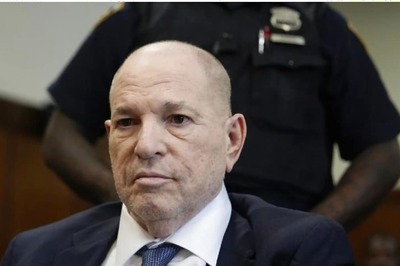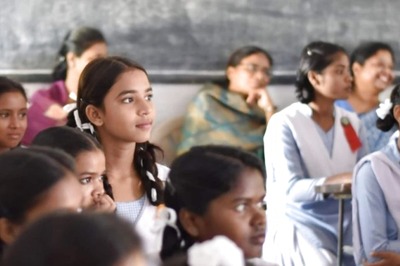
views
Mrinal Sen, who died in Kolkata on Sunday morning, was a true Bengali. He was as passionate about cinema as he was about politics and football and food. And as a true Bengali, he spoke animatedly and with profound sense. He would sometimes hold my hand with the fondness of an elder brother and talk about his own cinema, and about the cinema others made. Living just 15 minutes walking distance away from his South Kolkata home, I would often spend hours with him over endless cups of steaming hot chai in rapt attention. He was never boring, he hardly ever repeated himself and my attention could never waver. That was Mrinal Babu for many of us.
The one other city where I met him apart from my own Kolkata - where I grew up, went to school and college and had my initiation in journalism at The Statesman – was Cannes. This was much later in my life, when I had left Kolkata for Chennai and The Hindu. He was getting on in years, and needed help to walk, and spotting me at a press conference – which must have been quite easy being the only brown guy among a sea of white journalists – he asked me to take him around. We walked a bit on the legendary Croisette, Cannes' beach front, along a path that many celebrities must have gone by. Why, I am told Prince Rainier and the Hollywood beauty, Grace Kelly, had once walked hand in hand on the Croisette – as I did with Mrinal Babu, who needed a hand to keep himself steady.
Interestingly, Sen had four of his movies presented at Cannes (Satyajit Ray had seven) Ek Din Pratidin in 1980 Competition; Kharij in 1983 Competition, which won the Jury Prize; Khandhar in 1984 A Certain Regard (and which was shown in 2010 as part of Cannes Classics) and Genesis (1986 Competition). I was part of the audience which watched a brand new print of Khandhar, and the auditorium was packed, and stood up at the end to applaud a master moviemaker.
Sen's career in cinema began many decades before 2010. He made his first film in 1955, Raat Bhore, with Uttam Kumar (who went on to become an iconic star in Bengal). But the movie crashed. Sen's next outing, Neel Akasher Neechey, won him local applause, while his third feature, Baishey Shravan, gave him international recognition.
But it was 1969 and Bhuvan Shome that catapulted Sen to dizzying heights. That year, along with Mani Kaul (with his Uski Roti) and Basu Chatterjee (Sara Aakash), Sen's Bhuvan Shome heralded what came to be termed New Wave. In the next few years, this phenomenal Wave caught on with some brilliant works emerging – Pattabhi Rama Reddy's Samskara, Adoor Gopalakrishnan's Swayamvaram, Kumar Sahani's Maya Darpan, Awtar Krishna Kaul's 27 Down, MS Sathyu's Garam Hawa and Shyam Benegal's Ankur.
Bhuvan Shome was a poignant narration of an elderly ticket-examiner's life as a widower, and how his principled existence changes after he goes on a hunting expedition to Gujarat, where he meets Gauri (a young and pretty Suhasini Mulay). One of the earliest works to have been funded by the National Film Development Corporation of India, Bhuvan Shome Or Mr Shome – which can be seen as having parallels with Jean Renoir's The Rules of the Game – was a classic study of how a stiff, rather well-to-do gentleman is tutored by a village belle, rustic and, well, romantic. After his disastrous bird hunting venture, Shome (played by Utpal Dutt with singular brilliance) is a completely transformed man.
Sen, who was born on May 14, 1923, at Faridpur, now in Bangladesh (and he would get very nostalgic when he reminisced about his home), left for what was then Calcutta to study physics at the well known Scottish Church College, and later his Masters at Calcutta University. His love for cinema tumbled out of a heap of books on movie aesthetics, and his job as a technician in a film studio finally pushed him behind the camera. Interestingly, his association with the cultural wing of the Communist Party of India rubbed off on some of his movies.
His 1971 Interview (where Ranjit Mallick first appeared on screen) was path-breaking. Its style and technique were innovative, and with the plot touching upon facets like anti-establishment, unemployment and middle class cowardice, Interview had strong political undertones.
The following year, Sen crafted Calcutta 71 (the second of his Calcutta trilogy along with Padatik), which was even more political. Through a bunch of four stories, Sen depicted with all their brutality, the Naxalite movement, hunger among the common people and the poisonous social as well political corruption. It was a strong indictment of the ruling class.
Even more disturbing was Sen's Akaler Shandhaney – where a cinema crew travels to a village to recreate the 1943 Bengal Famine (man made and which killed five million Bengalis). As the crew tries to document the tragic suffering, a strange mix of the past and the present begins to unfold, and with two excellent performers – Smita Patil and Dhrtiman Chatterjee – the film remains etched in memory.
Some of Sen's later works wandered away from the political path towards more personal kind of subjects. Ek Din Pratidin narrates the story of a young girl (Mamata Shankar) from a middle class family who fails to return home one night, and her parents worry because some harm might have befallen her, and that her absence might worsen their own economic suffering. Here, Sen underlines the selfishness that often mar intimate relationships.
In Khandhar, a mother waits for a man who had promised to marry her daughter (Shabana Azmi), but when he fails to turn up, three friends who are passing by take pity on the old woman, and one of them agrees to wed the young girl. The mother dies happy that her daughter had found a companion, but the men leave.
Sen's last work in 2002, Aamar Bhuvan (with Nandita Das) was yet another take on disillusionment and deceit. Certainly not in the league of his earlier films, perhaps age and ill-health taking a toll on his creative abilities, Aamar Bhuvan sank without much ado.
(Gautaman Bhaskaran is an author, commentator and movie critic)




















Comments
0 comment